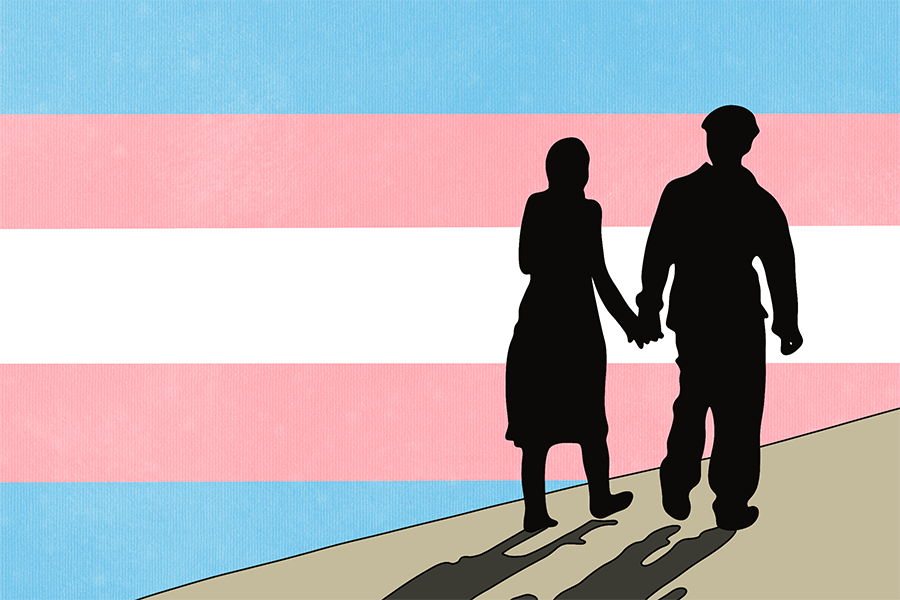Gender-Queer, Non-Binary, and Trans Task Force members reflect on demands to Northwestern
Daily file illustration by Meher Yeda
The GQNBT Task Force, created in 2018, provides recommendations to improve University policies and create a more gender-inclusive campus environment.
June 16, 2021
Northwestern’s Gender-Queer, Non-Binary, and Trans Task Force released recommendations to serve the University’s transgender, nonbinary and gender non-conforming community in February 2020.
Then, NU’s campus shut down, shifting those priorities.
The original report, led by sociology Prof. Héctor Carrillo and former Women’s Center Director Sekile Nzinga, emphasized seven key points. The recommendations included structural identity affirmations, gender-inclusive learning and working environments and expansions of facilities, healthcare services and resources. It also called for gender-inclusive residential services and robust community connections.
“We assessed the current landscape to identify gaps in policies and resources, and to recommend strategies that will facilitate an accessible, safe, and welcoming campus environment for trans and gender nonconforming students, faculty, and staff at Northwestern,” the report read.
Carrillo said the past year has been somewhat disruptive to the implementation of the report’s recommendations.
Still, the points outlined in the report remain important objectives for University administration, he said.
“Our hope is that the university will gradually take the steps to address these various recommendations. We understand that not all of them can be addressed at once,” Carrillo said. “But I think that that report summarizes and distills the issues that came up as most important.”
Since the report was published, Carrillo said, there have been many administrative turnovers. Nzinga has since left the University to serve as chief diversity officer for Gov. J.B. Pritzker.
University spokesperson Rochelle Ritchie said in an email to The Daily that NU has worked on health and well-being services, inclusive facilities and name and identity affirmations.
Namely, Multicultural Student Affairs has started a calendar of events for community members to interact with nonbinary and trans practitioners to progress wellness out of colonial concepts, she said. A formal partnership with Northwestern Medicine will also seek to reduce barriers for healthcare access.
“In addition to existing gender-open restrooms, over the past year the University has updated single-user restroom signs in highly trafficked buildings on the Evanston campus from gendered signs to ‘Restroom,’ making the facilities available for anyone in the community,” Ritchie added.
Illinois passed a law to designate single-occupancy restrooms as all-gender, which went into effect on Jan. 1, 2020. In accordance with the amendment, the University has posted a public map of the restrooms on its website, which is frequently updated, she said.
Among other measures, the housing website removed language that promotes the gender binary in the last year, Ritchie said. The University has also published a guide on inclusive language, specifying style based on genders and sex, gender-neutral language, pronouns and general LGBTQ+ terminology.
Medill Prof. Douglas Foster, a member of the GQNBT task force, said the group’s deliberations and the construction of the report was a big moment for the university. He said he believes that the report has the potential to usher in real, widespread changes.
“The expectation I had going in was that it might be a kind of narrowly targeted process,” Foster said. “I was pretty pleased to see that we were actually going to take on an institution-wide examination of everything from names and identity to health services to inclusive spaces to residential services.”
With students returning to campus under very different conditions this coming fall, Foster said it’s important that the University begins to adopt these recommendations and start making itself a more accepting environment for new students.
After over a year of prolonged change and uncertainty, Foster said these changes should be central to a return to normal campus life.
“What happens in that first quarter, can make a huge difference,” he said. “And for non-binary students, for queer identified students, the feel of the place — does it feel like a place where I’m really treated as if I belong? — matters.”
Email: [email protected], [email protected]
Twitter:@Joshdperry
Related Stories:
— Report highlights priorities for gender-queer, non-binary and transgender members of Northwestern
— Northwestern scholars co-found Center for Applied Transgender Studies with institutions worldwide
— ASG approves Gender and Sexuality Resource Center relocation


